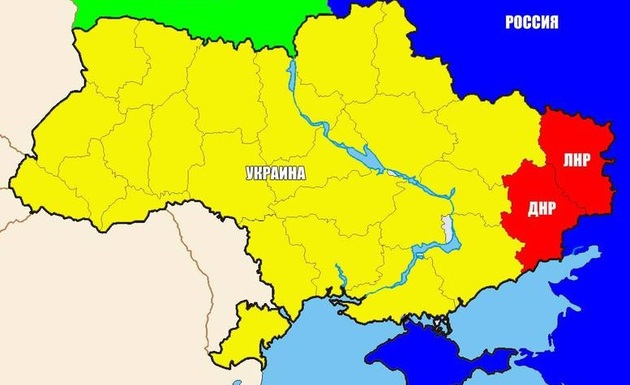Several high-ranking representatives of Kiev at once made statements on the situation in Donbass and the negotiation format of the settlement. The statements run counter to the agreements reached during the talks in early July in Berlin, in which the advisers to the heads of state of the Normandy Four took part. As a result, Russia suspected Ukraine of wanting to change the negotiation format and again wasting time.
Dmitry Kozak, Deputy Head of the Presidential Administration of the Russian Federation, who participated in the Berlin negotiations, said that if in the coming days the President of Ukraine Volodymyr Zelensky does not clarify the position of Kiev, then Moscow has the right to consider that the Ukrainian side is withdrawing from the Minsk Agreements, and, as a result, from the Normandy format of negotiations on a settlement conflict in Donbass.
The assessment of Russian Foreign Minister Sergei Lavrov sounded in a similar spirit. In his opinion, Kiev essentially abandoned the Berlin agreements. The minister explained that important agreements were reached in the German capital regarding the exchange of prisoners, security, and the coordination of the texts of orders by the conflicting parties - Kiev, DPR and LPR. And perhaps most importantly, Ukraine has pledged to submit its own version of legislative amendments to give the LPR and DPR a special status in accordance with the Minsk agreements. However, Lavrov said, subsequent statements by the Ukrainian side indicate that it does not want to fulfill the agreements reached in Berlin.
The cheese-boron has flared up because of the article by the Deputy Prime Minister of Ukraine Alexey Reznikov, published by the Atlantic Council Research Center (USA). In fact, it was said about the need to change the current Minsk process as ineffective. Some Ukrainian media added fuel to the fire, announcing that in Berlin Russia demanded constitutional changes from Ukraine regarding the special status of the Donbas self-proclaimed republics. It seems that the case was not without a banal drain. But this doesn't make it any easier, especially since Aleksey Reznikov in his article questioned everything that is possible, having "agreed" to the point that Kiev was forced to sign the Minsk agreements at gunpoint, and these agreements do not reflect the situation in eastern Ukraine, and therefore are not feasible in terms of conflict resolution. In addition, Reznikov made another sharp statement, noting that Ukraine's goal is to return the territories that are now “temporarily occupied”.
Between the lines, of course, it reads - since Kiev sets such a goal, and calls the uncontrolled territories "occupied", then it is reasonable to assume that it is not inclined to constructively consider the issues of the special status of the self-proclaimed Donbass republics. In general, Reznikov's article itself contains a direct call to Western partners to reconsider the format of negotiations and adapt it to new geopolitical realities, and not cling dogmatically to what was written several years ago and which did nothing in promoting a settlement in practical terms. plane. And although the text contains a reservation that in spite of everything Kiev is ready to continue working in the Minsk process, the Russian side has ample reason to doubt the sincerity of this approach and to demand specific clarifications from the top political leadership of Ukraine. Which was done.
President Volodymyr Zelensky has denied this. But from a slightly different angle. In particular, he said that Ukraine is an independent state, and therefore no one has the right to demand domestic political decisions. Zelenskiy may, of course, think so, but history is full of reverse examples. The statement of the head of the presidential office, Andrei Yermak, who participated in the negotiations in Berlin, also turned out to be unconvincing. Ermak, in particular, said that no one demanded anything from Ukraine, but at the same time admitted that the negotiations were very difficult. Without going into the nuances of the difficulties, Andriy Yermak summed up: Germany and France supported Ukraine. However, what exactly is the support, he also did not specify.
And yet, from the further explanations and half-words of Ukrainian officials, it became clear that in Berlin the status of the DPR and LPR was still discussed. But not in a constitutional way, but on a bill on a special order of local self-government in areas not controlled by Kiev. Actually, there is such a law. Since 2014. But the DPR and LPR do not even consider it, “offended” by the fact that it was received by the Verkhovna Rada without agreement with the leadership of the republics. Moreover, in one way or another, it envisages ultimately liquidating the DPR and LPR in their current form, albeit with the granting of the broadest powers to local authorities in the future.
Today in Kiev there is talk of a willingness to take into account the interests of the self-proclaimed republics more than ever before. In particular, the same Andriy Yermak noted that the new bill could include the "Steinmeier formula", or package issues of holding elections to local authorities, expanding their powers, ceasefire, withdrawal of troops, transfer of control of the border with the Russian Federation to Ukraine. However, it is very difficult to imagine the implementation of such a package, and even in a short time. Moreover, with different approaches to the problem: Kiev believes that it can and should be resolved through direct dialogue with Moscow, while Moscow recommends Kiev to negotiate with Donetsk and Lugansk and continues to insist on the gradual implementation of the Minsk agreements.






